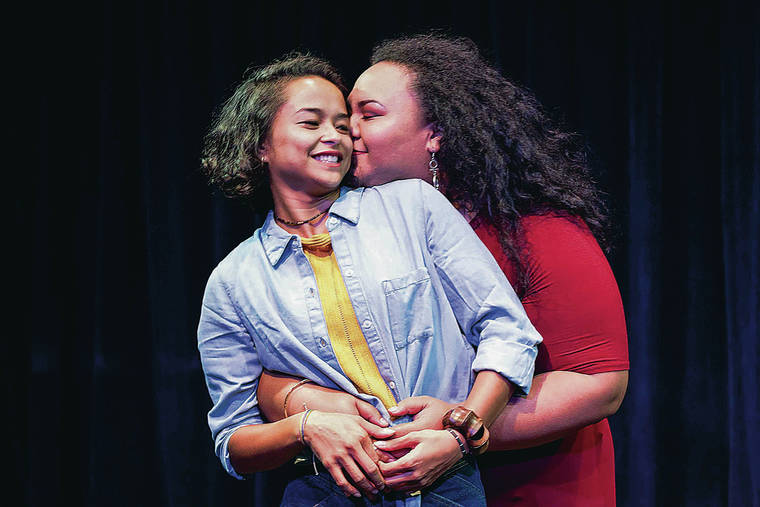Playwright explores queer experience in ‘Fa‘alavelave: The Interruption’

COURTESY KUMU KAHUA THEATRE
In “Fa‘alavelave: The Interruption,” Kamalani Gapol, left, and Lelea‘e Buffy Kahalepuna portray Mele and Sefina, two women in a same-sex partnership who must deal with relatives who don’t understand their relationship.
Mele and Sefina are Samoan women living in Honolulu, happy and deeply committed to their same-sex relationship, when word comes that Mele’s father has died. Mele has had nothing to do with him for years, but her family expects her to return to the Big Island, help her aunts with the funeral observances, and then assist them in sorting through her father’s affairs.
Mele doesn’t want to go, but Sefina convinces her that she should. The couple goes to the Big Island, meets Mele’s aunts, and finds themselves among people who are far more conservative and less accepting of same-sex relationships than their friends in Honolulu.
Amid the confrontations that follow Mele learns things she never knew about her father, her aunts, her cultural legacy, Sefina and herself.
Will Mele’s relationship with Sefina survive?
Welcome to island playwright Kiki Rivera’s multi-layered contemporary drama, “Fa‘alavelave: The Interruption.” Rivera wrote it in 2017 as her Masters of Fine Arts project at the University of Hawaii-Manoa; it premiered at Kennedy Theatre that year. Rivera revised the play, adding more conversation and revelation, including a scene with Mele’s aunties, who discuss the women’s relationship.
Rivera also introduced Mele to Hawaii audiences in a one-act play presented at Kumu Kahua earlier in 2017.
Don't miss out on what's happening!
Stay in touch with breaking news, as it happens, conveniently in your email inbox. It's FREE!
The refined version of “Fa‘alavelave” opens today at Kumu Kahua Theatre.
The Samoan word “fa‘alavelave” can be translated into English in several ways — as “trouble,” as referring to a life-interrupting event such as a wedding or a funeral, or as the act of causing trouble or annoyance.
The conflicts in both plays come out of clashes between cultures. When Samoans rejected their indigenous religion and embraced Christianity in the 1800s, traditional Christian notions of body shame, an insistence on monogamous sexual relationships and the view that same-sex sexual activity is sinful became part of Samoan culture.
In pre-Christian Samoan culture same-sex relationships were not stigmatized and there was widespread acceptance of the fa‘afafine, men who chose to dress and live as women.
“It depends on who you ask, there are a lot of different stories, but the truth of the matter is, it was more accepted then than it is today,” Rivera said. “I’ve brought in the fa‘afafine story.”
Rivera praises the direction by Reiko Ho. “I watched a rehearsal, and Reiko does a really great job of focusing in on the lovers and telling that story, and how they’re affected by the family and all of these different things,” she said.
Rivera was raised in Hawaii, and is of Samoan, German, Filipino, Spanish and Chinese ancestry. She wants to see more opportunities for Pacific islander playwrights to have their stories staged along with the work of Caucasian and Asian-American writers.
“I feel like I became a playwright by accident because there was this need,” she said. “Not because I had this deep desire to be part of the American theater, but cause there was this need. I’m hoping the younger generation of Samoans, in the diaspora especially, can read our plays and watch our plays and know that they are all part of Samoa.”
While “Fa‘alavelave: The Interruption” has been in rehearsals at Kumu Kahua, she’s been working on another story with completely different characters, set in Waianae.
Rivera invites other Pacific islanders to follow her lead.
“People want to hear these stories,” she said. “The first thing to do is just start writing. That’s where it starts.”
“FA‘ALAVELAVE: THE INTERRUPTION”
>> Where: Kumu Kahua Theatre, 46 Merchant St.
>> When: 8 p.m. today (sold out); continues 8 p.m. Thursday-Saturday through Dec. 7; also at 2 p.m. Sunday, through Dec. 8. No show Thursday, Nov. 28 (Thanksgiving)
>> Cost: $5-$25
>> Info: 536-4441, kumukahua.org Opens in a new tab



